I wasn’t prepared for was how much I would actually enjoy Stardew Valley; it is one thing to revel in nostalgia and feels of yesterday, and another to truly feel enjoyment. I could easily pull up a Final Fantasy 1 or 2, but I assure you, I wouldn’t play for very long. I would appreciate where gaming had started and where it had influenced the future, but the game itself wouldn’t hold up for me over time. There is a relevance that has been lost, and can’t quite be gotten back. The pleasure of many old games is knowing where you have come from rather than to see where you are going.
That’s what I had been expecting when I booted up Stardew Valley. A nice, pleasurable romp through old memories, where I plant some seeds, harvest some fruits, then see if I could make it through a year in-game before my attention would wander back to other games as boredom set in. I would put it away with a smile, happy with the purchase, but done with the farming genre again for a few more years.
Except, that’s not what happened. Instead, I’m finding myself being thrown back into digital farming with a vengeance. I’m becoming fully invested not only in making the best damn farm that I can, but also saving the sleepy, wonderful Pelican Town from becoming a corporate shell of its old self. Also, I picked up a rake and shovel in real life for the first time in two years.
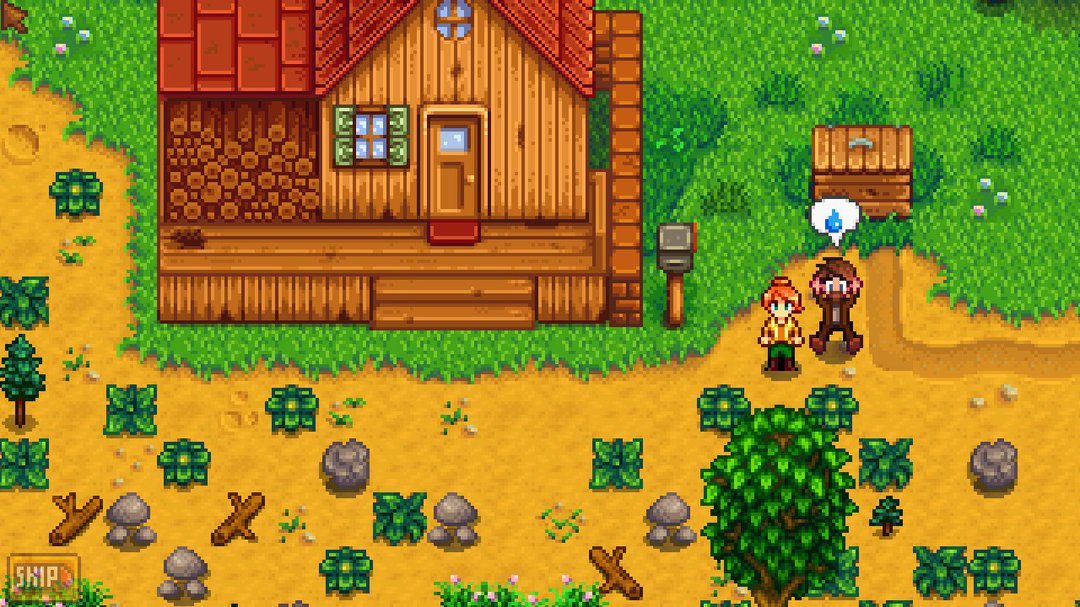
… Give me a moment to explain.
Stardew Valley appears, at first glance, to be a throwback to games over a decade old, where the main formula hasn’t seemed to change. Like in the original Harvest Moon series, you inherit your farm from a will, and you return to find it in shambles. Through digital blood sweat and tears, you slowly restore, even improve, upon this gift of rural self-sustenance. You can forage for materials, build up ways to keep animals, and you interact with the tiny, quant, adorable town. This sort of game was meant to help you slow down, take a moment, and feel like you had some control in the day-to-day of life through its slowed down pacing. It was escapism in a way that was calm and soothing, rather than the world-saving adventures like Zelda or being a gun-toting spy like Golden Eye. It felt good in its simplicity, and as many people found, could be strangely addictive.
However, Stardew Valley is not just a simple clone: there was plenty that the developer added, thanks to the various attempts in the genre since Harvest Moon first took off. Combat has been added in a simple form in an ode to Rune Factory, but the combat is to explore the mines, to give you a place to ‘farm’ gems and ore. There’s a library in town that’s looking for rare items to put on display, and a quest board added with random small tasks to help you start growing your relationships with the citizens in town. Crafting has been added in a big, giving more relevance to a post Minecraft world. The game is immediately more addictive just because there have been new ways to progress and see improvement on your farm.
Despite all these improvements, it’s not these game design additions that fascinate me the most. Instead, I’m enraptured about how well the game has stayed true to its roots while also including the modern world. It’s how it has taken a fantasy game about escapism and made it relevant to my own life, to the point where it’s actually uplifting, a motivational force to get off the couch and create something for myself.
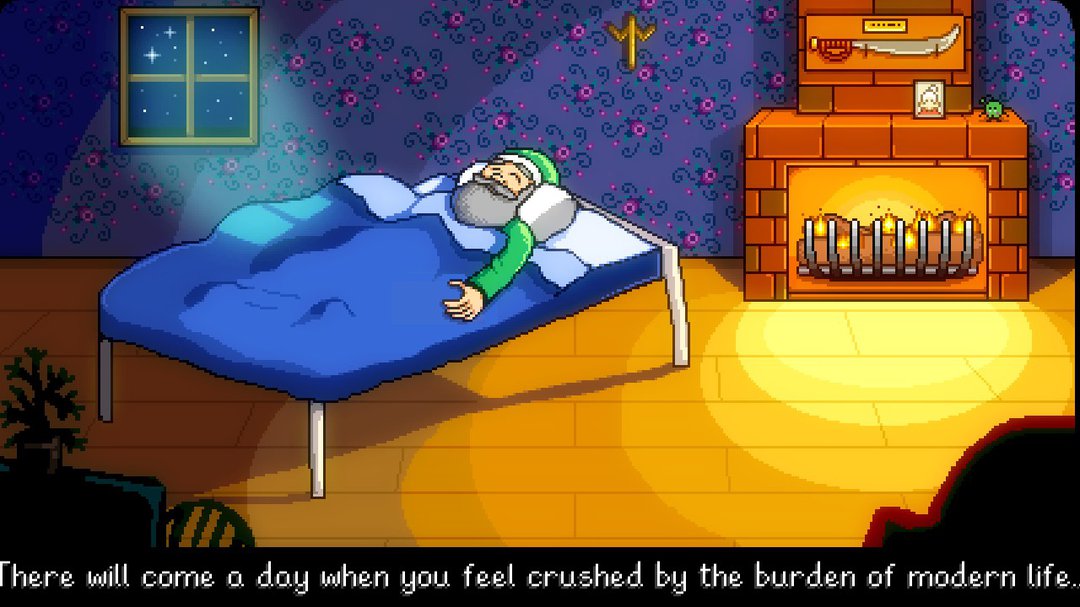
Grandparents are so uplifting.
It starts the same way the original series did; well, almost the same way. In Stardew Valley, you are treated to an actual monologue by your fading family member, where he makes it clear that this will & testament is only to be opened after you have experienced modern life, and after it has beaten you down.
Then, in this opening sequence, they show you being beaten down.
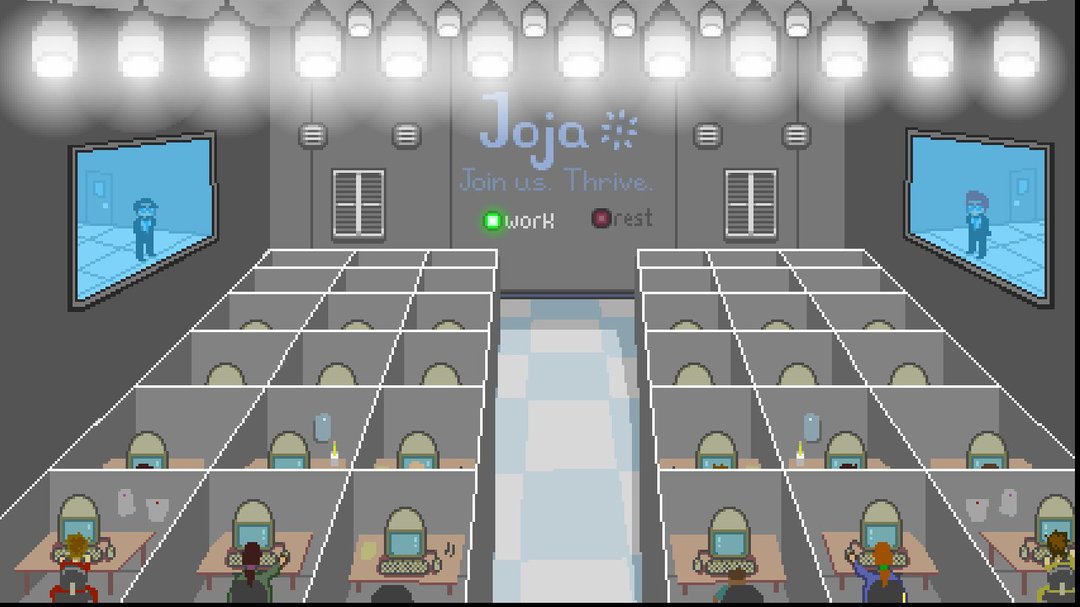
It's always great when a game can capture so much in just one screenshoot - like the feeling of mind numbing drudgery, for example
It’s only for a few moments that you are thrust into this cubicle farm, but that time is more than enough. It’s enough for me to identify with my avatar, to suddenly understand why someone from the 21st century would want to be tugged back to a form of life that seems quaint in comparison. It’s enough because part of me wants that to happen… in fact, that’s part of why the zombie apocalypse narrative is so damn popular: modern life, for all of its convenience and luxury, has come with some pretty heavy price tags. Constant connection to the wider world is something that wears on many people, becoming an obsession to check in every few hours rather than a resource to be used. Our jobs have, for a variety of reasons, become more and more disconnected from a place where we can see the fruits of our labor.
Pushing data through a computer, or selling products that you didn’t help create doesn’t have the same sense of weight as farming; there’s a source of pride in pulling things you’ve grown out of the ground, by knitting your own clothes, by creating things that are yours, to keep or sell as you so please.
This idea of self-creation, of self-fulfillment, is actually one of the reasons why gaming exists to being with, and why is growing in popularity. As more and more jobs seem to pull away from having a sense of immediate cause-and-effect, the easier it is to feel more disconnected from your day to day life. Jane McGonigal writes about it in Reality Is Broken, with quotes like “games are providing rewards where reality is not". The idea of being a hero, someone that has a great cause-and-effect on a world, even virtual, is enticing, and can help be a huge boost to your own personal morale. Games can give us a sense of fulfillment that many retail or secretarial jobs just can't provide.
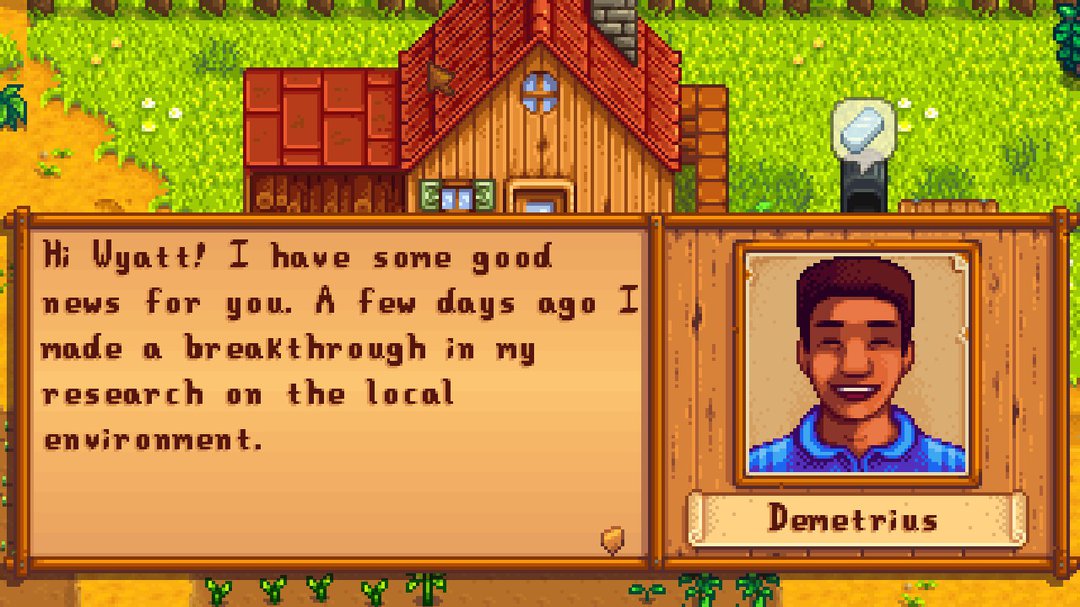
You can matter in the lives of the villagers in Pelican Town, giving a sense of closeness that we don't often have with neighbors anymore.
Stardew Valley brings this idea full circle in a way that people obsessed with Minecraft would understand: you are empowered as the maker, the creator of your own little kingdom. It’s the pull of the “God Games” like SimCity or Civilization: it’s your empire, for better or worse. One of the last games I spoke about in this genre, Banished, is still one of my favorites because of its ability to make you feel both like a powerful mayor for your village, but also terrified it’s all going to fall apart on you next winter.
However, Stardew Valley is not a god game. It’s also not a sandbox game like Minecraft, where it’s fun, but there isn’t much of a story. This farming simulator hits the sweet spot between them, where you are given story, but it’s made to become your story. It’s a game where you get to shape and craft the world, but there is an avatar, there are characters that react to your successes and failures. Your choices matter, and the seasonal changes give a sense of time and continuity to them. The developer managed to weave in the theme of encroaching modernity a little deeper here: the store manager for the JoJa Food Mart on the edge of town walks into the local general store, handing out 50% off coupons, laughing at poor Pierre wails that he can’t compete. Shopping at the supermarket emboldens it, and if you purchase a membership, the old community center, aged and dilapidated, will be bought and made into a patented JoJa community center instead!
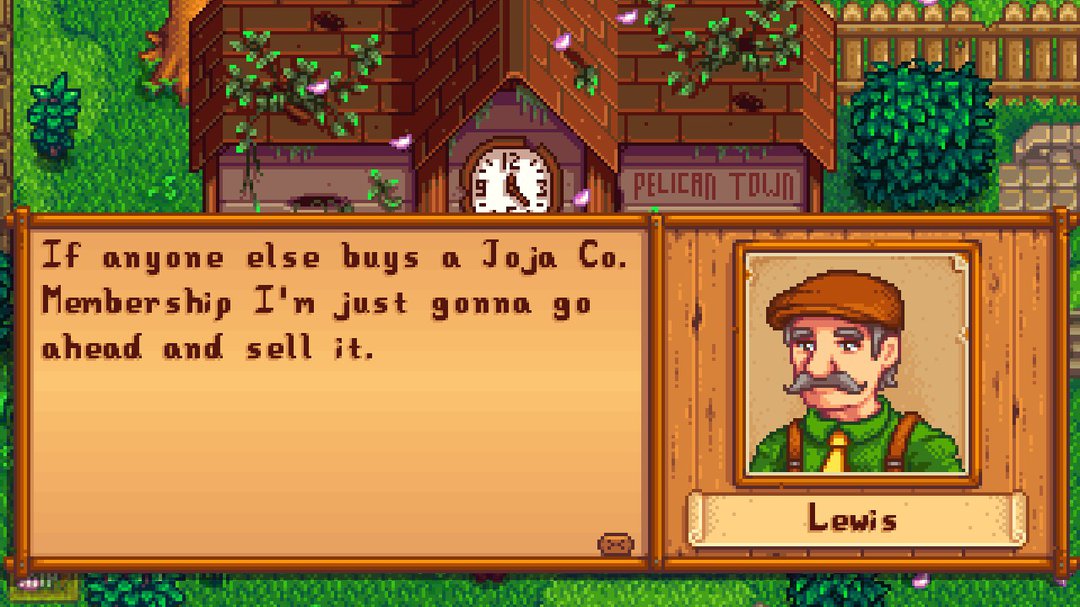
Even for the sake of a screenshot, I couldn’t get myself to buy it. I couldn’t bring myself to make that choice, and invite in a mega corporation into this small farming community.
Stardew Valley reminded me that taking an overgrown field and making something grow is a reward all by itself, even without eating the food yourself. Or, maybe for a different example, it reminded me why taking several hours to make this:
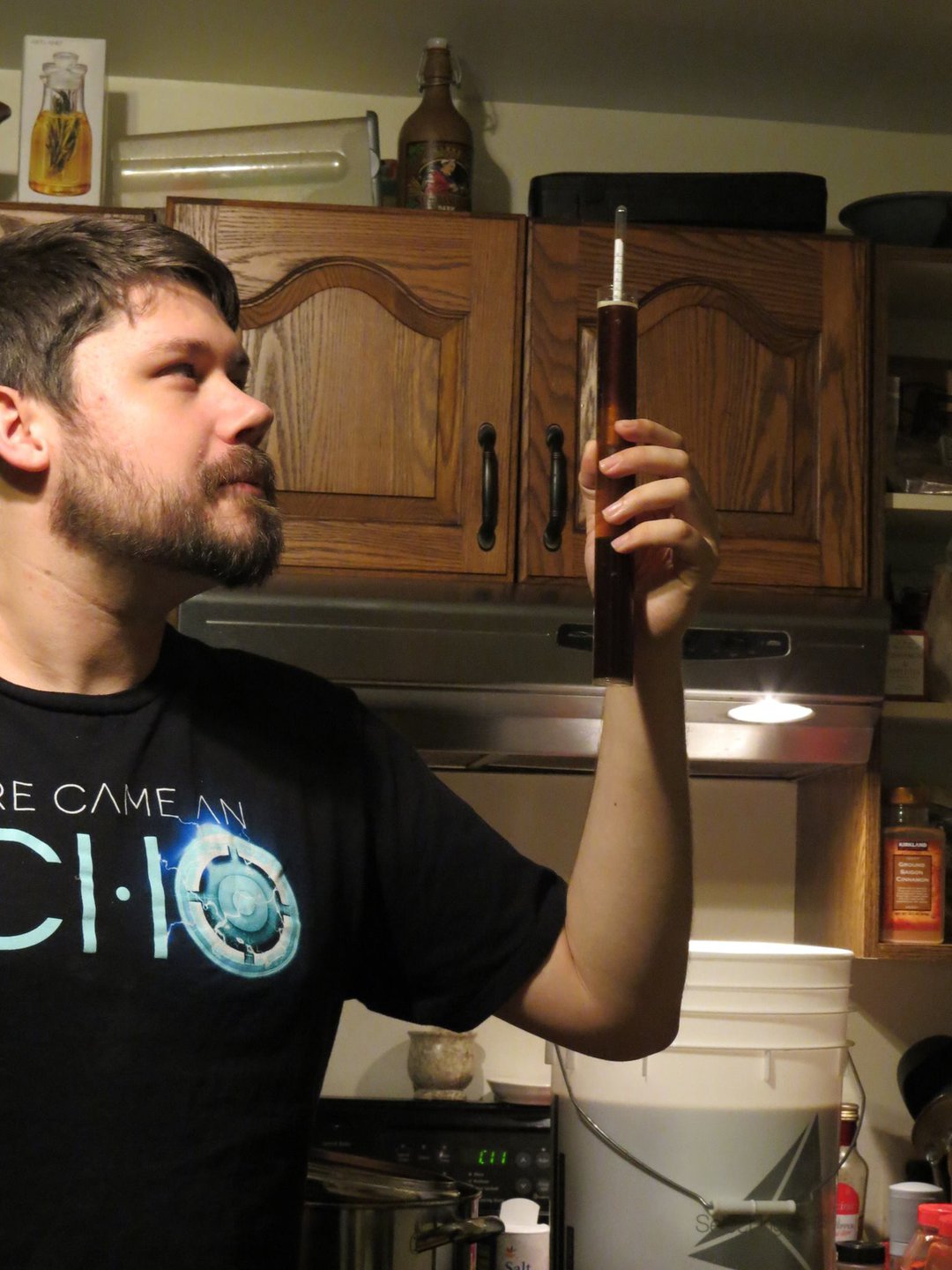
Beer Science is the Best Science
....Then taking another 2-3 weeks to age it, add to it, then bottle it to turn it into this:
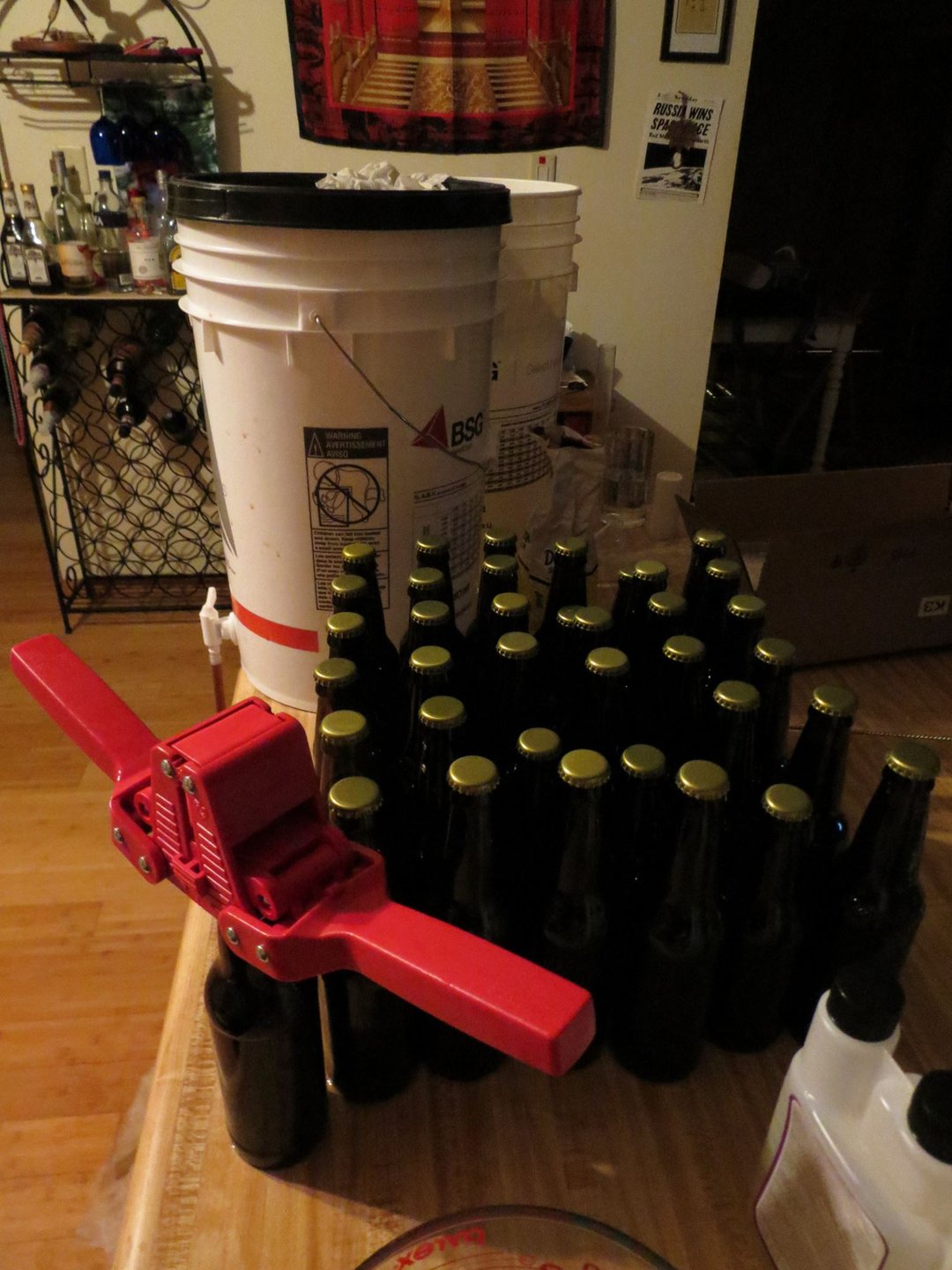
I swear, it didn't taste terrible. ...And none of my friends were poisoned accidentally during the process.
...Is so rewarding.
No, there weren’t any achievement points, no monetary gain, nothing lasting about this: it was beer after all, and so it was quickly consumed by myself and my friends. I'm not even saying it was particularly good beer, that would be able to call myself any sort of afficianado of alcoholic drinks. But while the bottles lasted? It was my product, my hard work. There was a pride in it that I just can’t get from pushing papers across a desk, or tapping keys on a keyboard. Again, like McGonigal says, "“Games make us happy because they are hard work that we choose for ourselves, and it turns out that almost nothing makes us happier than good, hard work.”
It goes further than just a small hipster-like side hobby. My wife and I started a vegetable garden a few years ago, along with the hopes and dreams of some grape vines, some blueberry bushes…. Something to help get us out of the house and into the dirt. It was rough, since we live on a hill: a lot of rocks, a lot of overgrowth, but we got it done. It didn’t look pretty, but we actually got food, enough for several meals. The next year, we expanded a little more, adding blueberry bushes and a spectacular failed attempt at growing carving pumpkins. We got one measily pie out of the bushes, and some tasty roasted seeds out of the tiny pumpkin that we did get, but that was enough. We sat around the kitchen table and wrote up a list of all the things we had done right and wrong, ready to try again next year.
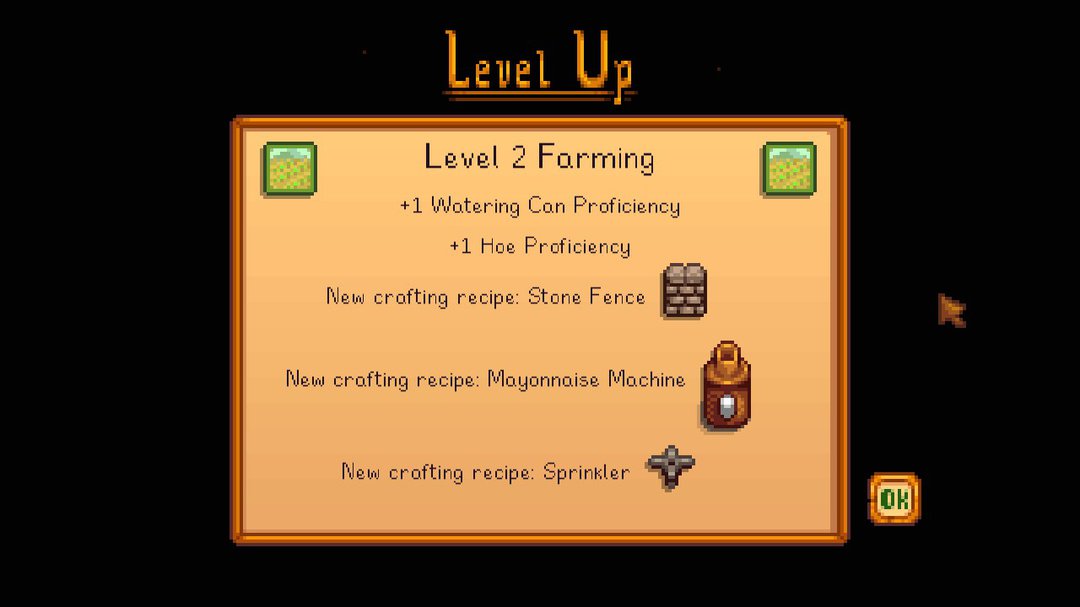
Levelling up in a video game can create a real physical thrill - why can't we imagine ourselves levelling up in things like this in reality?
Stardew Valley reminded me of the sensation of good, hard work. It was a gentle reminder, as my avatar had to wait a patient 15 days to see any results of their blueberry crop. A whisper in the back of my mind that there could be joy in things that modernity has passed off as mundane and tedious. Two weeks ago, I looked at the garden we had planted before: it was a mess, after the fence had been trampled by deer and snow, and you couldn’t even see where the tomatoes had once been. My wife and I had let it go for a year while we dealt with a wedding and real life circumstances, and now we couldn’t see any semblance of what we had managed before. But now… now, I wanted to get back out there.
Games are, like Jane McGonigal tells us, supposed to be a way for us to enjoy good, hard work of our own choosing. There’s a paradox though: games often focus on violence, on fantastical scenarios which yes, take a lot of time of practice and training to get really good at, but don’t have a way for us to apply those lessons into reality. Trust me, I’ve been loving the hell out of The Division, but it doesn’t inspire me to become a secret military agent, and it doesn’t have a way to directly inform my life as I live it now.
Games like Civilization and XCOM light up the cerebral, thoughtful side of my brain, helping train it towards analytical, big-scheme thinking… but I don’t really exist in a place where I can suddenly try to lead a nation towards winning the space race, much less fight off an alien invasion. My love of Darkest Dungeon actually was a great reflection on ideas of what success and failure really meant for me, as it had quite a few others, but again, the actual translation into real world skills isn’t quite there. I'm not exactly going to go spelunking into caves to hunt eldritch horrors anytime soon.
Stardew Valley succeeds because of how boring it can be. How it makes you work and be patient in its daily cycle, waiting to earn those pixelated heads of turnips and cabbage. It succeeds because it has made itself relevant to the daily grind, opening up wonderfully with this message that a completely modern, 21st life is missing something; something you don’t really realize is missing until someone brings it to your attention. The need to create, to craft something that is your own, whether it be your own food, or drink, or a personal cosplay costume. Something you can look at and say “I did that. This is my imperfect attempt to write a novel/compose a song/crochet a blanket, but it’s mine, damnit”.
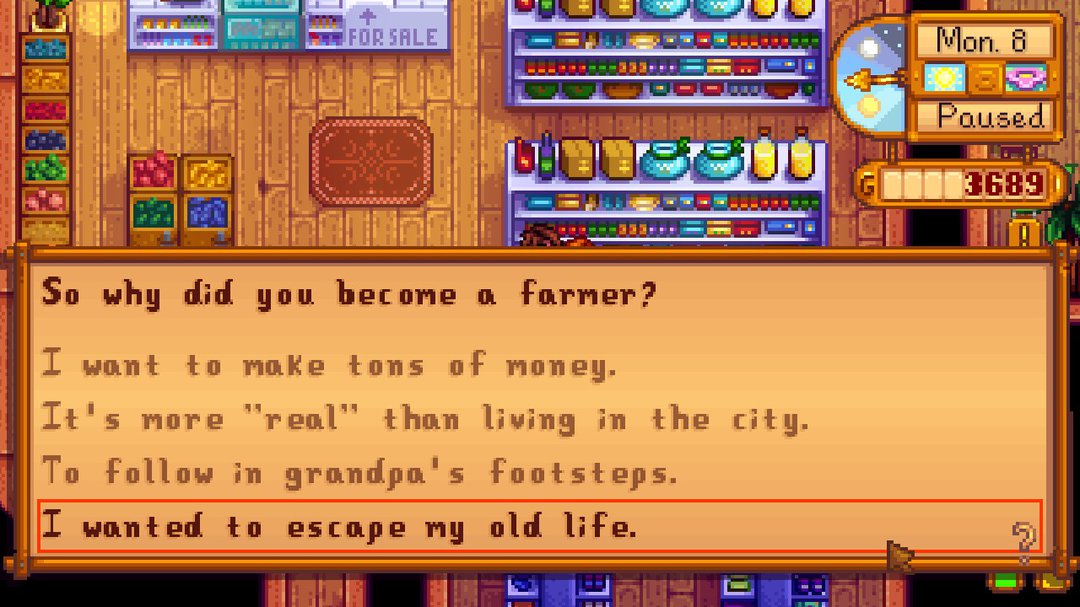
My grandparents were farmers and ranchers. I remember, when I was barely three feet tall, visiting them on the wide prairies of western Canada, and finding out what they had to do for years as a living. The thought of all that backbreaking labor confused, and even scared me. I remember wondering how they could look so happy and relaxed after all of that hard work for decades: wouldn’t that tire them out and leave them unhappy? I remember visiting another set of grandparents, and I saw this sprawling, disorganized garden instead of a lawn outside of Chicago, and my grandfather excitedly showing off his recent pull of carrots. They were crooked and uneven. I remember wondering why he didn’t just go out to the supermarket and get perfectly straight ones without all of that effort.
Many, many years later, I understand. I get why now more than ever, it’s important for us to sometimes take pride in the things we build for ourselves, rather than rely on the mass market that’s out there. I find it funny and ironic, yet inspiring that it took a piece of digital media to snap me out of a funk, and get me to go back outside and try again after a particularly trying year in the job market. I’m thankful for the reminder Stardew Valley has given me, and I’m excited as hell that it seems to be as popular and uplifting to others as well.
Now if you excuse me, I have to go attempt to finish some new fencing without throwing out my shoulder again. I’m sure it’s not going to be the prettiest, but it’ll be mine, damnit, and this’ll be the year we have our own pumpkins for Halloween.
Has a game ever touched you like this, or do you just think I'm a sentimental fool? Let us know in the comments, or follow our Facebook to argue with us about what games are important. Want more articles? Follow our Twitter, or check out our Patreon to help fund our fledging attempts to get away from the big city and start over.